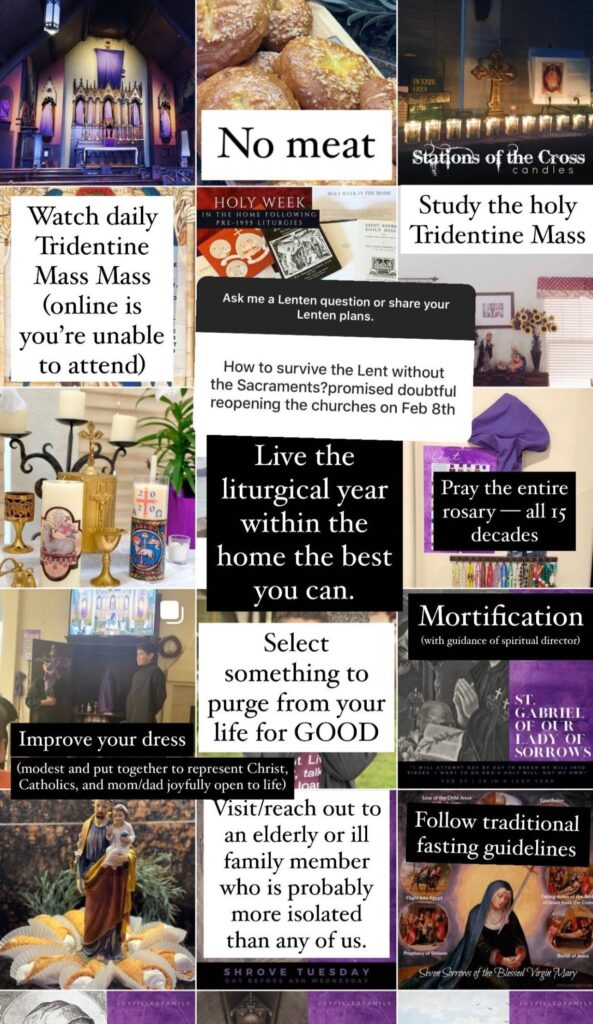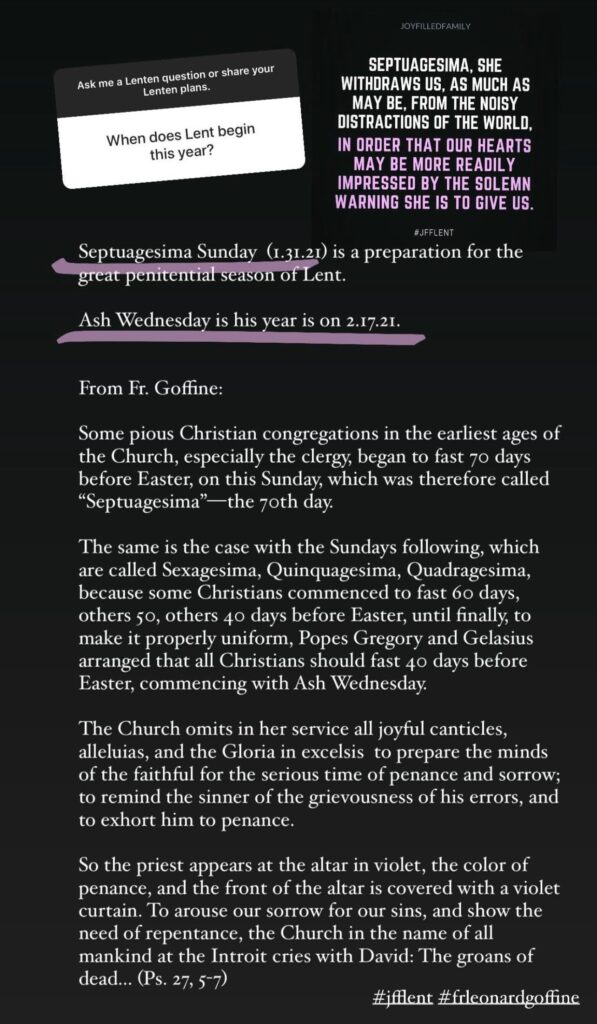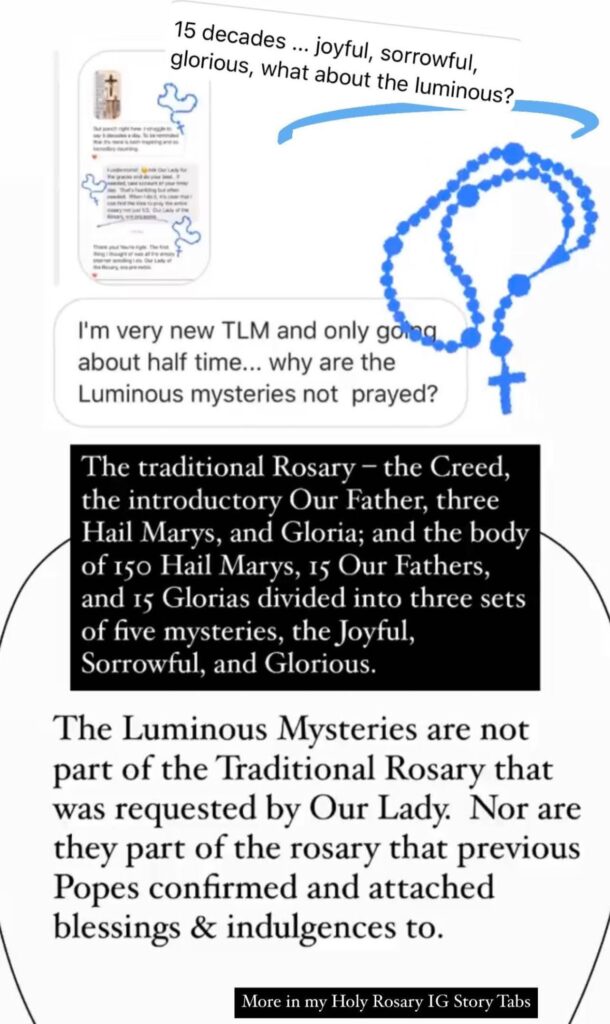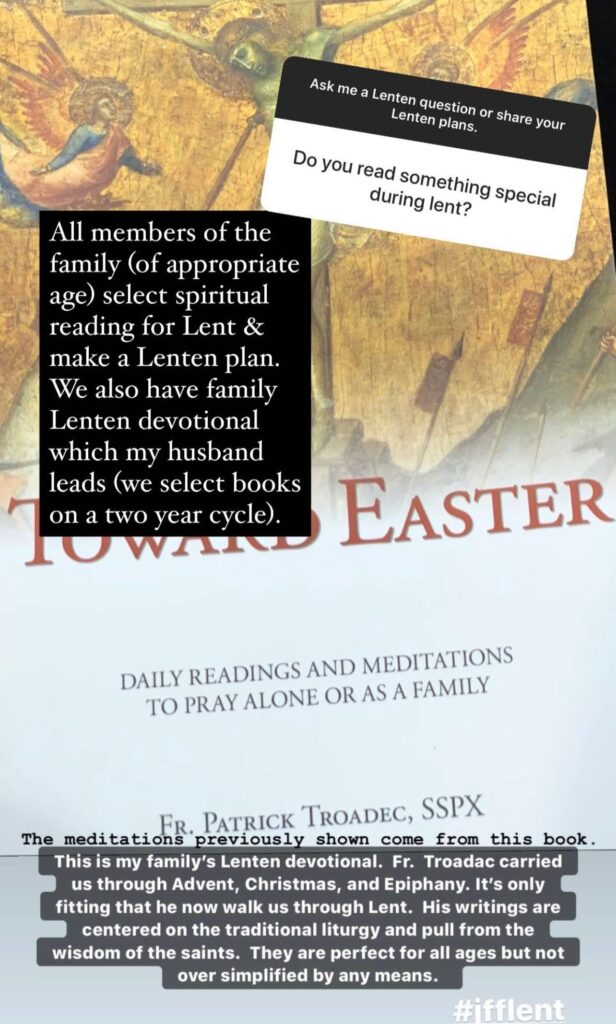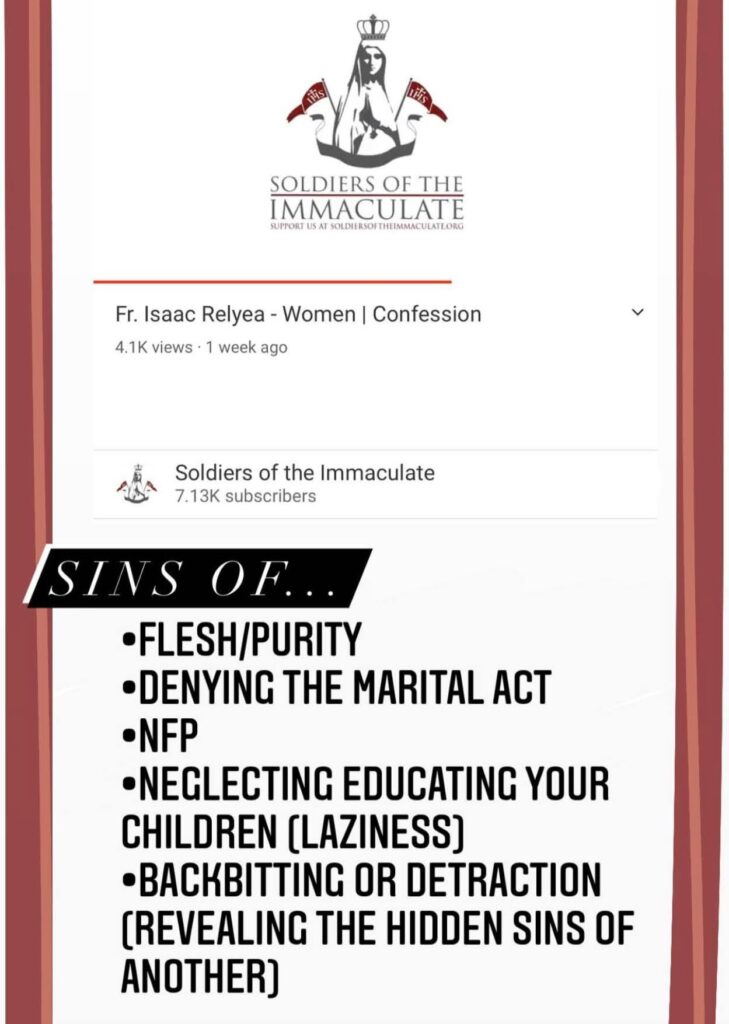St. Michael’s Lent is upon us!

It is not a tradition of the Church, perse. But it was one of the many periods of fasting & prayer in which St. Francis observed throughout the year.
This second Lent of sorts starts on the Feast of the Assumption and ends on the Feast of St. Michael.
During this time, he would fast, abstain, and engage in penances and mortifications to discipline himself, acquire the virtues, and honor God. In fact, it was while he was engaged in this “St. Michael’s Lent” that he received the stigmata.
To emulate St. Francis and make the 40-day St. Michael’s Lent in his honor, in honor of Our Lady and St, Michael the Archangel, and for the purpose of consecrating yourself to St. Michael on his feast day, do the following:
• Obey the precepts of the Church, including attending Mass and going to Confession as needed.
• Fast and abstain, as you would during Lent, from the Feast of the Assumption on August 15 to Michaelmas (the Feast of St. Michael the Archangel) on September 29 or otherwise make some daily sacrifice to God on those days.
• Pray the Prayer to St. Michael the Archangel, all of the supplications and accomanying prayers (the Our Father, Hail Mary, and Glory Be), and the Litany to St. Michael every day from the Assumption to Michaelmas.
• On Michaelmas, make the Act of Consecration to St. Michael the Archangel.
Note that the period between the Assumption and Michaelmas consists of 46 calendar days, but, as in the pre-Easter Lent, Sundays and holy days don’t count and aren’t penitential, so this devotion consists of 40 days’ worth of partial abstinence and fasting. – Fish Eaters
🙏🏼
Did you know of the Lent of St. Michael?
Do you plan to observe this period of fasting & prayer (in any way)?
Prayer to St. Michael the Archangel
St. Michael the archangel defend us in battle. Be our safeguard against the wickedness and snares of the devil. May God rebuke him we humbly pray, and do thou, O Prince of the Heavenly Host, by the power of God, cast into Hell Satan and all evil spirits who wander throughout the world seeking the ruin of souls.
First Supplication:
Oh, Glorious Prince of the Angelical Armies, we implore you, come with all of the Celestial Court, help us to unmask all of the strategies that the enemy and his evil retinue of followers have plotted against the children of light.
Pray one Our Father, three Hail Marys, and one Glory Be
Second Supplication:
Oh, Glorious Guardian of the Militant Church, we implore you, safely guard Holy Mother Church from the hands of all her persecutors, and fulfill the promise that came from the lips of her beloved spouse that the gates of hell will never prevail over her.
Pray one Our Father, three Hail Marys, and one Glory Be
Third Supplication:
Oh, Glorious Rescuer of the Suffering Church, we implore you, introduce into the Celestial Mansion all of the souls who suffer in Purgatory, and come quickly to our aid when our hour is at hand.
Pray one Our Father, three Hail Marys, and one Glory Be
Fourth Supplication:
Oh, Glorious Adorer of God, you who received the incumbency to preside over the adoration and worship that is given to Him in Heaven, we implore you, raise up an army of adoring souls on earth whose hearts burn with love for the Eucharistic Jesus.
Pray one Our Father, three Hail Marys, and one Glory Be
Fifth Supplication:
Oh, Glorious General of the Celestial Army, we implore you, remove all pride from us so that we may not do the same as Lucifer who was expulsed from the presence of the Lord.
Pray one Our Father, three Hail Marys, and one Glory Be
Sixth Supplication:
Oh, Glorious Warrior of the Most High, we implore you, do not permit us to become contaminated by a Spirit of rebellion against God and against the Holy Mother Church.
Pray one Our Father, three Hail Marys, and one Glory Be
Seventh Supplication:
Oh, Glorious Victor of the infernal hosts, we implore you, as you defeated Satan and all of the Legion of the fallen Angels, come to our assistance so that we may also reach the crown of victory.
Pray one Our Father, three Hail Marys, and one Glory Be
Eighth Supplication:
Oh, Glorious Defender of those who struggle, we implore you, defend us in the combat against the enemy, against the powers that in the world want to separate us from God and against our own worldly desires.
Pray one Our Father, three Hail Marys, and one Glory Be
Ninth Supplication:
Oh, Glorious Model of Obedience, we implore you, make us submissive to the Will of God, helping us to fulfill it even when our humanity is reluctant to accept it.
Who Is Like God? R. No One Is Like God!
Who Is Like God? R. No One Is Like God!
Who Is Like God? R. No One Is Like God!
Pray one Our Father, three Hail Marys, and one Glory Be
Let us pray: Oh Glorious St. Michael, Prince of the Divine hosts, Holy Defender of the people of God; defeater of the dragon, and who now vigilantly defends the Church of God against the gates of hell, urgently we implore you: Help us in the painful and dangerous battle that we have to fight against the same enemy that you defeated. Stay with us, Oh Powerful Prince, so that we may fight courageously and defeat Satan, and with your help reach the prize of the Beatitudes. Amen.
Litany of St. Michael the Archangel
L: Lord, have mercy on us,
All: Lord have mercy on us.
L: Christ, have mercy on us.
All: Christ, have mercy on us.
L: Lord, have mercy on us,
All: Lord have mercy on us.
L: Christ, hear us.
All: Christ , hear us.
L: Christ, graciously hear us.
All: Christ, graciously hear us.
L: God the Father of heaven,
All: Have mercy on us.
L: God the Son, Redeemer of the world,
All: Have mercy on us.
L: God the Holy Spirit,
All: Have mercy on us.
L: Holy Trinity, one God
All: Have mercy on us.
Holy Mary, Queen of the Angels, pray for us.
St. Michael, pray for us.
St. Michael, filled with the wisdom of God, pray for us.
St. Michael, perfect adorer of the Incarnate Word, pray for us.
St. Michael, crowned with honor and glory, pray for us.
St. Michael, most powerful Prince of the armies of the Lord, pray for us.
St. Michael, standard-bearer of the most Holy Trinity, pray for us.
St. Michael, guardian of Paradise, pray for us.
St. Michael, guide and comforter of the people of Israel, pray for us.
St. Michael, splendor and fortress of the Church Militant, pray for us.
St. Michael, honor and joy of the Church Triumphant, pray for us.
St. Michael, light of Angels, pray for us.
St. Michael, bulwark of orthodox believers, pray for us.
St. Michael, strength of those who fight under the standard of the Cross, pray for us.
St. Michael, light and confidence of souls at the hour of death, pray for us.
St. Michael, our most sure aid, pray for us.
St. Michael, our help in all adversities, pray for us.
St. Michael, herald of the everlasting sentence, pray for us.
St. Michael, consoler of souls detained in the flames of Purgatory, pray for us.
St. Michael, whom the Lord has charged to receive souls after death, pray for us.
St. Michael, our prince, pray for us.
St. Michael, our advocate, pray for us.
Lamb of God, Who takes away the sins of the world, spare us O Lord.
Lamb of God, Who takes away the sins of the world, graciously hear us O Lord.
Lamb of God, Who takes away the sins of the world, have mercy on us.
Christ, hear us. Christ, hear us.
Christ, graciously hear us. Christ, graciously hear us
Pray for us, O glorious St. Michael, Prince of the Church of Jesus Christ.
All: That we may be made worthy of His promises.
L: Let us pray.
All: Sanctify us, we beseech You, O Lord Jesus, with Your holy blessing, and grant us, by the intercession of St. Michael, that wisdom which teaches us to lay up treasures in Heaven by ex-changing the goods of this world for those of eternity, You who lives and reigns forever, world without end. Amen.

Act of Consecration to St. Michael
To be made on Michaelmas (September 29)
Oh, most noble prince of the angelic hierarchies, valorous warrior of Almighty God, and zealous lover of His glory, terror of the rebellious angels, and love and delight of all the just ones, my beloved Archangel, Saint Michael, desiring to be numbered among your devoted servants, I, today, offer and consecrate myself to you, and place myself, my family, and all I possess under your most powerful protection.
I ask you not to look at how little, I, as your servant, have to offer, being weak and sinful, but to gaze, rather, with favorable eye at the heartfelt affection with which this offering is made, and remember that if from this day onward I am under your patronage, you must during all my life assist me, and procure for me the pardon of my offenses and sins, the grace to love with all my heart my god, my dear Savior Jesus, and my sweet Mother Mary, and obtain for me all the help necessary to arrive at my crown of glory.
Defend me always from my spiritual enemies, particularly in the last moments of my life. Come then, O glorious prince, and help me in my last struggle, and with your powerful weapon, cast far from me and into the abyss that proud angel that one day you defeated in the celestial battle. Saint Michael, defend us in our daily battle so that we may come to glory in the last judgment, Amen.
.
#catholicmotherhood #catholiclife #traditionalcatholic #traditionalcatholicism #traditionalcatholicfamily #catholic #liturgicalliving #liturgicallivingtlm ##tradcatholic #catholicfamily #comingtotradition #catholicresistance
#lexorandilexcredendilexvivendi
![[Image: ?u=https%3A%2F%2Ftse1.mm.bing.net%2Fth%3...%3DApi&f=1]](https://media1-production-mightynetworks.imgix.net/asset/55979932/1679410473284.png?ixlib=rails-4.2.0&fm=jpg&q=75&auto=format&w=1400&h=1400&fit=max&impolicy=ResizeCrop&constraint=downsize&aspect=fit)
![[Image: ?u=https%3A%2F%2Fpaintingvalley.com%2Fim...f=1&nofb=1]](https://media1-production-mightynetworks.imgix.net/asset/55980015/1679410535676.png?ixlib=rails-4.2.0&fm=jpg&q=75&auto=format&w=1400&h=1400&fit=max&impolicy=ResizeCrop&constraint=downsize&aspect=fit)

![[Image: ?u=http%3A%2F%2Fwww.victorianweb.org%2Fa...f=1&nofb=1]](https://media1-production-mightynetworks.imgix.net/asset/55457998/1678721887215.png?ixlib=rails-4.2.0&fm=jpg&q=75&auto=format&w=1400&h=1400&fit=max&impolicy=ResizeCrop&constraint=downsize&aspect=fit)
![[Image: ?u=http%3A%2F%2Fwww.rpcerie.org%2Fimages...f=1&nofb=1]](https://media1-production-mightynetworks.imgix.net/asset/55458257/1678722077193.png?ixlib=rails-4.2.0&fm=jpg&q=75&auto=format&w=1400&h=1400&fit=max&impolicy=ResizeCrop&constraint=downsize&aspect=fit)
![[Image: ?u=https%3A%2F%2Ftse4.mm.bing.net%2Fth%3...%3DApi&f=1]](https://media1-production-mightynetworks.imgix.net/asset/55458336/1678722154248.png?ixlib=rails-4.2.0&fm=jpg&q=75&auto=format&w=1400&h=1400&fit=max&impolicy=ResizeCrop&constraint=downsize&aspect=fit)
![[Image: ?u=http%3A%2F%2Fhopefaithprayer.com%2Fwp...f=1&nofb=1]](https://media1-production-mightynetworks.imgix.net/asset/55458335/1678722154651.png?ixlib=rails-4.2.0&fm=jpg&q=75&auto=format&w=1400&h=1400&fit=max&impolicy=ResizeCrop&constraint=downsize&aspect=fit) “And the last state of that man becometh worse than the first.”–Luke 11.If there were no relapses into sin, few children of the Church would lose their souls. For where is the Catholic, who, having had the misfortune of falling into mortal sin, has not, at least once, confessed with the intention and purpose of sinning no more? But Satan endeavors to destroy the good which the Lord works in the heart of the sinner by confession, and if he succeed again in forcing an entrance into that heart, it will be difficult indeed to dislodge him.
“And the last state of that man becometh worse than the first.”–Luke 11.If there were no relapses into sin, few children of the Church would lose their souls. For where is the Catholic, who, having had the misfortune of falling into mortal sin, has not, at least once, confessed with the intention and purpose of sinning no more? But Satan endeavors to destroy the good which the Lord works in the heart of the sinner by confession, and if he succeed again in forcing an entrance into that heart, it will be difficult indeed to dislodge him.![[Image: QSZwaWQ9QXBp]](https://media1-production-mightynetworks.imgix.net/asset/55458477/1678722270964.png?ixlib=rails-4.2.0&fm=jpg&q=75&auto=format&w=1400&h=1400&fit=max&impolicy=ResizeCrop&constraint=downsize&aspect=fit) “And he was casting out a devil, and the same was dumb.” LUKE xi. 14.
“And he was casting out a devil, and the same was dumb.” LUKE xi. 14.![[Image: ?u=http%3A%2F%2Fmovimientonj.org%2Fwp-co...f=1&nofb=1]](https://media1-production-mightynetworks.imgix.net/asset/55457163/1678721073189.png?ixlib=rails-4.2.0&fm=jpg&q=75&auto=format&w=1400&h=1400&fit=max&impolicy=ResizeCrop&constraint=downsize&aspect=fit)
![[Image: ?u=http%3A%2F%2Fimages.fineartamerica.co...f=1&nofb=1]](https://media1-production-mightynetworks.imgix.net/asset/55457312/1678721218096.png?ixlib=rails-4.2.0&fm=jpg&q=75&auto=format&w=1400&h=1400&fit=max&impolicy=ResizeCrop&constraint=downsize&aspect=fit)
![[Image: ?u=https%3A%2F%2Fcontent.ngv.vic.gov.au%...f=1&nofb=1]](https://media1-production-mightynetworks.imgix.net/asset/55457382/1678721314394.png?ixlib=rails-4.2.0&fm=jpg&q=75&auto=format&w=1400&h=1400&fit=max&impolicy=ResizeCrop&constraint=downsize&aspect=fit)
![[Image: ?u=http%3A%2F%2F1.bp.blogspot.com%2F-DCw...f=1&nofb=1]](https://media1-production-mightynetworks.imgix.net/asset/55457464/1678721380710.png?ixlib=rails-4.2.0&fm=jpg&q=75&auto=format&w=1400&h=1400&fit=max&impolicy=ResizeCrop&constraint=downsize&aspect=fit)
![[Image: ?u=http%3A%2F%2Fhumanityhealing.net%2Fwp...f=1&nofb=1]](https://media1-production-mightynetworks.imgix.net/asset/55457530/1678721432320.png?ixlib=rails-4.2.0&fm=jpg&q=75&auto=format&w=1400&h=1400&fit=max&impolicy=ResizeCrop&constraint=downsize&aspect=fit)
![[Image: ?u=https%3A%2F%2Fi.pinimg.com%2Foriginal...f=1&nofb=1]](https://media1-production-mightynetworks.imgix.net/asset/55457645/1678721524488.png?ixlib=rails-4.2.0&fm=jpg&q=75&auto=format&w=1400&h=1400&fit=max&impolicy=ResizeCrop&constraint=downsize&aspect=fit)
![[Image: ?u=https%3A%2F%2Fimgix.ranker.com%2Fnode...f=1&nofb=1]](https://media1-production-mightynetworks.imgix.net/asset/55457647/1678721524355.png?ixlib=rails-4.2.0&fm=jpg&q=75&auto=format&w=1400&h=1400&fit=max&impolicy=ResizeCrop&constraint=downsize&aspect=fit)

